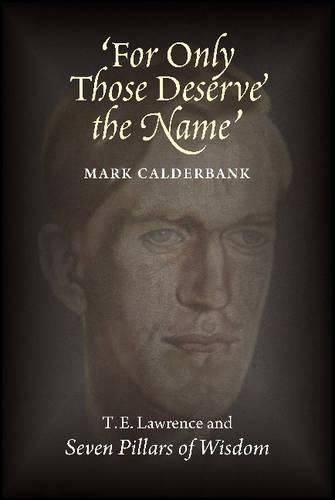Readings Newsletter
Become a Readings Member to make your shopping experience even easier.
Sign in or sign up for free!
You’re not far away from qualifying for FREE standard shipping within Australia
You’ve qualified for FREE standard shipping within Australia
The cart is loading…






In Seven Pillars of Wisdom, his epic of the Arab Revolt, T E Lawrence wanted to write a work of spiritual greatness, comparable to The Brothers Karamazov, and Thus spake Zarathustra. For only those deserve the name’, he wrote to Charlotte Shaw, recalling his ambition to be a great writer. Mark Calderbank’s biography shows how post-World War I political developments in the Middle East, and Lawrence’s unsettled life and sense of guilt, influenced the published work and contributed to his sense of failure. By following multiple lines of enquiry into chosen events, Mark Calderbank shows us a story coloured by a retrospective vision of history, a post-war Weltanschaung, and the compulsion to present an exemplary personality. This approach has the deepest significance for the interpretation of the Seven Pillars’ reliability as a historical source, in particular the interweaving of fantasy and historical truth, and excessive personalisation. The psychology of masochism plays a prominent role in interpreting the drama of the Self’, especially the notorious incidents at Dera’ and Tafas. Problems of personality are paramount. Seven Pillars has been overly influential and has long required a reassessment. The 100th anniversary of the Revolt is opportune. Of especial significance are the revealing of accounts of other participants, and Lawrence’s presentation of the Arabs and of history, both of which remain highly topical. The Epilogue, a commentary on an essay (1940) by Andre Malraux, appraises the meaning of literature in Lawrence’s life. To date, Seven Pillars has eluded evaluation. In the end , wrote Herbert Read, the reader finds himself alone: he has to decide for himself. Calderbank’s majestic reassessment is long overdue.
$9.00 standard shipping within Australia
FREE standard shipping within Australia for orders over $100.00
Express & International shipping calculated at checkout
In Seven Pillars of Wisdom, his epic of the Arab Revolt, T E Lawrence wanted to write a work of spiritual greatness, comparable to The Brothers Karamazov, and Thus spake Zarathustra. For only those deserve the name’, he wrote to Charlotte Shaw, recalling his ambition to be a great writer. Mark Calderbank’s biography shows how post-World War I political developments in the Middle East, and Lawrence’s unsettled life and sense of guilt, influenced the published work and contributed to his sense of failure. By following multiple lines of enquiry into chosen events, Mark Calderbank shows us a story coloured by a retrospective vision of history, a post-war Weltanschaung, and the compulsion to present an exemplary personality. This approach has the deepest significance for the interpretation of the Seven Pillars’ reliability as a historical source, in particular the interweaving of fantasy and historical truth, and excessive personalisation. The psychology of masochism plays a prominent role in interpreting the drama of the Self’, especially the notorious incidents at Dera’ and Tafas. Problems of personality are paramount. Seven Pillars has been overly influential and has long required a reassessment. The 100th anniversary of the Revolt is opportune. Of especial significance are the revealing of accounts of other participants, and Lawrence’s presentation of the Arabs and of history, both of which remain highly topical. The Epilogue, a commentary on an essay (1940) by Andre Malraux, appraises the meaning of literature in Lawrence’s life. To date, Seven Pillars has eluded evaluation. In the end , wrote Herbert Read, the reader finds himself alone: he has to decide for himself. Calderbank’s majestic reassessment is long overdue.